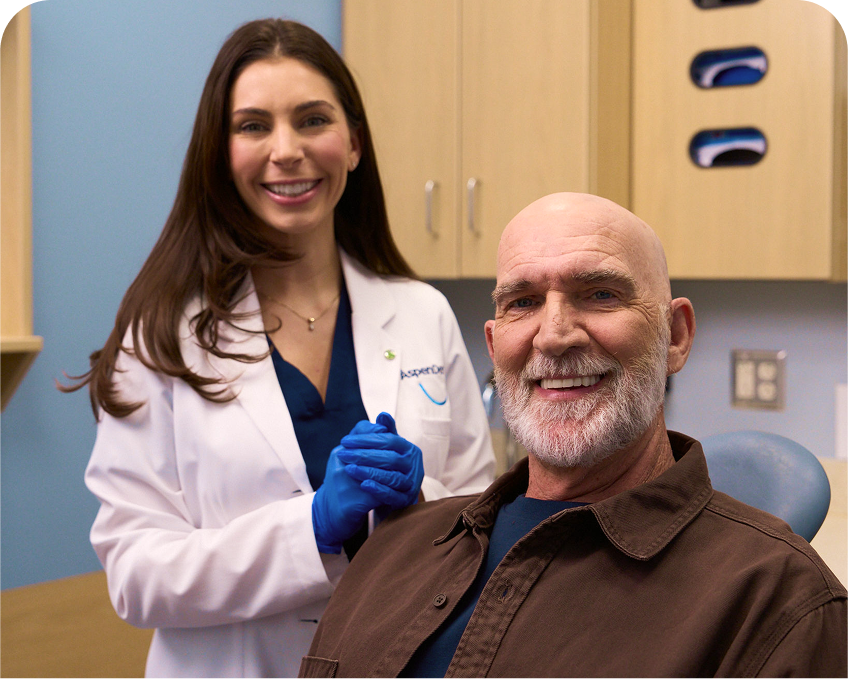
Dental crowns (tooth caps), types and procedure
If your tooth is cracked, worn or weakened, a crown can bring it back to strength—and help you feel like yourself again. At Aspen Dental, getting started is simple. Walk in, call or schedule online today. We’ll explain your options, your costs and your next steps before any treatment.
What is a dental crown?
A dental crown is a custom cap that covers the visible part of your tooth. It restores natural shape and strength, protects weak enamel and refreshes your smile. Your dentist may recommend a crown for deep cracks, heavy wear, large fillings or to reinforce a tooth after a root canal.

How do dental crowns work?
A crown works like a protective shell. It fits over your tooth to seal out bacteria at the edges, brings the tooth back to its proper shape and makes sure your bite lines up. By hugging the tooth, it spreads chewing forces across a wider surface—reducing the chance of new fractures or sensitivity.
A strong dental cement bonds it in place, and materials like ceramic or zirconia are chosen to balance durability with a natural look.
What are the benefits of a dental crown?
Conceal imperfections
Covers chipped tooth, cracks, discoloration, and small alignment issues. We’ll compare with bonding or veneers to find what fits your goals, smile and budget.
Protect a damaged tooth
Adds strength to a cracked tooth or one treated with a root canal. Helps protect the tooth long term and helps to make it easier to bite and chew.
Complete your restoration
Finishes other care—like bridges or single-tooth implants—so your smile feels complete from every angle. Each crown is custom-shaped and shaded to blend in naturally.
Types of dental crown materials for your needs
There are several crown options with different strengths and materials. We’ll help you choose based on where the tooth sits, how you bite and how you want it to look.
Ceramic or porcelain
Natural appearance for front teeth and many premolars.
Zirconia
Extra strength and durability in high-pressure areas.
Porcelain fused to metal
Balance of strength and appearance.
Full metal
High durability for select back teeth outside the smile line.
Dental crown procedure: a step-by-step guide
Here’s what your dental crown visit looks like at Aspen Dental:
Impressions or digital scans
We capture your bite through impressions so your crown fits and blends naturally with your smile.
Temporary crown placement
While the lab makes your permanent crown, a temporary protects your tooth.
Permanent crown placement
We check fit and bite, then cement the crown—so it looks and feels like your own.
Before the procedure
If a dental crown is recommended, here’s what happens next—why it’s needed, comfort, appearance and how we prepare the tooth.
Damaged tooth
A crown is recommended when a tooth is discolored, decayed, cracked or worn and needs coverage to stay strong.
Pain or function issues
You may have sensitivity or trouble chewing. We’ll evaluate the cause and explain whether a crown is the right fix.
Cosmetic concerns
Chips, large fillings or uneven shape can change your smile. A crown restores a natural, consistent look.
Preparation
The tooth is reshaped so the crown fits securely. A temporary crown protects it between visits, along with simple care tips.
After the procedure
Once your crown is on, here’s what to expect—how it looks, functions, protects and how to care for it.
Restored appearance
Your crown is color matched and contoured to blend with neighboring teeth for a natural-looking smile.
Full function
As the area settles, chewing becomes comfortable again. Use the tooth as directed once your dentist gives the go-ahead.
Protection
The crown covers and reinforces the tooth to help prevent future wear, cracks or breaks.
Initial adjustments
A brief “new tooth” feel or mild sensitivity is common and should fade. If it lingers or the bite feels high, we’ll adjust it.
Long-term care
Brush, floss around the crown and keep regular checkups. Good home care helps your crown last.
How much does a tooth crown cost?
Dental crown costs depends on the tooth, material and what it takes to restore your smile. At Aspen Dental, we’ll walk you through every cost upfront—insurance, out-of-pocket costs and ways to pay through flexible financing options.
Does insurance cover tooth crowns?
With or without insurance, we help remove financial barriers to help make sure you get the care you need.
Most insurance accepted
We work with most providers to make care accessible as much as possible. We do not accept Medicaid.
Check if your insurance is accepted >
Affordable dental crowns without insurance
No insurance? No worries. For only $49/year, we offer our Aspen Dental Savings plan so you can save 15% on dental crowns.²
Discover the Aspen Dental Savings Plan >
²The Aspen Dental Savings Plan is NOT insurance. Please see plan terms and conditions for details.
Why choose Aspen Dental for your dental crowns?

Comprehensive care
We offer a full suite of dental services for all of your smile needs.

Same-day appointments
With same-day availability and flexible hours, seeing your provider is easy.

Made affordable to you
99% of patients who apply for 3rd-party financing are approved.
Caring for your dental crown
Brush twice daily with a soft brush and fluoride toothpaste. Floss gently at the crown edge—slide the floss out instead of pulling up. Avoid very hard foods like ice or popcorn kernels. If you clench or grind, ask about a night guard to protect crowned and natural teeth. Keep regular checkups so we can monitor fit and wear.
Why patients trust us for dental crowns
When you’re searching for “dental crowns near me”, we’re here for you.Dental crown FAQs
Are dental crowns painful?
Our goal is to keep you comfortable every step. Your Aspen Dental care team uses local anesthesia during the procedure and checks in throughout so you can tell us how you’re feeling. Some pressure or mild sensitivity afterward is common and usually eases with simple home care. If discomfort feels unusual or doesn’t improve, contact your Aspen Dental office and we’ll take a look.
What steps are involved in getting a dental crown, and how long does the process take?
Getting a crown typically involves two visits. At the first, your dentist at Aspen Dental shapes the tooth, takes a scan or impression and places a temporary crown to protect the area. At the second, they’ll fit and cement your custom crown once it’s ready from the lab. Your care team will walk you through each step and make sure you’re comfortable the entire way. For more detail, see our dental crown procedure guide.
Why might I need a dental crown?
Crowns help protect and restore teeth. Your dentist may recommend one to repair a broken tooth, cover a tooth after a root canal, rebuild a worn-down tooth or improve appearance when other options won’t hold up. Your care team will talk through the best solution for your smile.
What materials are used for dental crowns, and what are their advantages?
Crowns are made from a variety of materials depending on your needs. Common crown choices include:
Zirconia for added durability and strength
Porcelain fused to metal for balance of strength and appearance
Full metal for certain back teeth where strength matters most
Your dentist will recommend what works best for your bite, oral health goals and budget.
How do I find a qualified dental provider for a dental crown procedure?
Start with a provider who explains your options clearly, answers your questions and gives a written estimate before care begins. Ask about experience with cases like yours, and how they handle fit, bite checks, X-rays and follow-up visits. At Aspen Dental, we’re with you every step of the way.
Are there risks to getting a dental crown?
Most people do well with crowns. But like any procedure, there can be minor risks—like temporary sensitivity, bite adjustments or gum irritation. Rarely, you might need further care if symptoms persist. Your Aspen Dental care team helps reduce risk with careful planning and clear instructions. If something doesn’t feel right, contact your local office. We’ll take a look.
How long do dental crowns last?
With good care, crowns can last many years. Regular dental checkups, daily brushing and flossing, and habits like wearing a night guard (if recommended) can all help extend their lifespan. Avoiding very hard foods and keeping up with your routine preventive cleanings also makes a difference.
Can dental crowns be repaired or replaced?
Yes. If there’s a small chip or minor wear, your dentist may be able to smooth or repair it. If the crown is cracked, loose or worn down, they may recommend a replacement. Your Aspen Dental care team will check the crown’s fit and condition—and guide you toward the most reliable fix.
